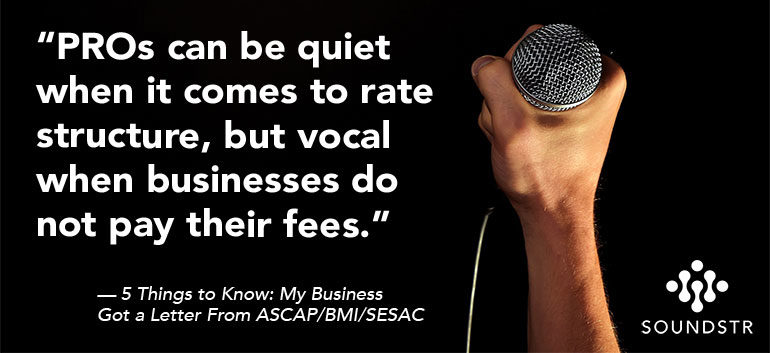[vc_row][vc_column][vc_column_text]The last thing any business owner wants is another bill.
It seems like the cost of operating a brick and mortar business gets more expensive by the day. But what if you receive an invoice in the mail for something you have been using (without payment) for years? That’s exactly what can happen if you see a letter from a performing rights organization.
Performing rights organizations (“PROs”) collect for the commercial use of music in businesses. A letter from these organizations (ASCAP, BMI, SESAC and Global Music Rights in the USA) might take you by surprise. But there are a few things that you need to know to make sure your business is using music in a legal way that avoids expensive fines. (And by expensive, we mean upwards of $150,000.)
Here are 5 things you need to know about the Performing Rights Industry and its affiliated organizations:
1. What PROs charge for is completely legal.
Based on US Law, any time a song (“work”) is performed (broadcast or performed live) in a business, you (“music user”) must pay the creator (“songwriter”) for that right. There are some exemptions, which should be understood. PROs collect fees from businesses and distribute them to the songwriters they represent. This is a complicated process, but we’re here to help simplify and explain.
2. This is an old, outdated industry.
The first US PRO (ASCAP) launched in 1914, with competitors SESAC in 1930 and BMI in 1939. (Global Music Rights is the new kid on the block, who launched in 2015). ASCAP and BMI have entered into Consent Decrees with the US Department of Justice. These documents govern and set the standard for collection of performing rights fees by these two groups. These documents are updated every 10 or so years, the last of which came in 2001. (Note: major changes have been proposed on June 30th, 2016 – click HERE to learn more.) All PROs are bound by the last major overhaul to US Copyright Law: the Revised Copyright Act of 1976. These updates help the industry adapt to new standards and technology. But at the end of the day, these changes do not happen often enough, and many businesses are pushing for serious changes and updates.
3. PROs are litigious.
Although the PROs are quiet when it comes to their rate structure, they are vocal when venues do not pay their fees. In April 2016, ASCAP sued 10 bars that did not comply. These infractions might not seem like much, but consider each case. ASCAP fined a Cincinnati-bar $90,000 for not paying an annual $5,000 fee. This demand was only made by a single PRO – there are now four in the US. Lawyers are expensive. Fines are more expensive. Paying for a product you use is the right thing to do.
4. Balancing the system.
There are movements and efforts to make this a fairer and more transparent industry. Most business owners agree that music is a valued asset to their business. People don’t spend much time in silent bars, coffee shops, restaurants and nightclubs. Music helps drive business. Songwriters should receive compensation for commercial use of their music. Paying PRO fees is the right and legal thing to do. But there needs to be a balanced approach. These fees need to reflect actual music use. Business owners need to know that the money they pay is making its way back to the correct songwriters. A fairer system means more businesses could license music, avoiding fines or lawsuits. More money would flow into the system for songwriters. Transparency surrounding fees is a win-win.
5. Technology might be the answer.
As of today, PROs charge businesses and venues a general blanket license fee for music performances. This fee offers the ability to play all music from a PRO’s catalog. This is different from other mediums (radio, television, Internet), which pay only for the music they use. This fee structure, known as a Per Segment License, requires tracking of music use. Until recently, technology could not identify live music performances. With the ability to track music use, businesses can gather the necessary data to potentially negotiate lower fees. On a larger scale, this could lead to Per Segment licenses for all businesses. This could help lower rates for businesses and help songwriters get paid when their works are used.
Receiving a warning letter from one of these businesses can be intimidating, and a quick Google search can only add to your fears. But it is important to know what you are paying for. Music helps business, from building customer loyalty to helping sales. While the current system does work in theory, a health balance is necessary. Businesses should only pay for the music they use. Songwriters should receive compensation for the commercial use of their music. More transparency would solve many problems, and technology is here to offer a solution.
Click below for a FREE webinar that discusses how you can start identifying music in your business and potentially lower your performing rights fees.


